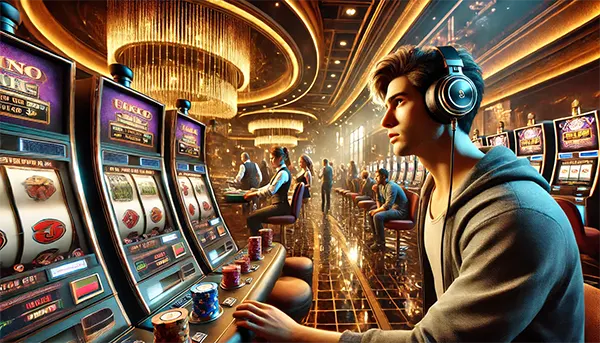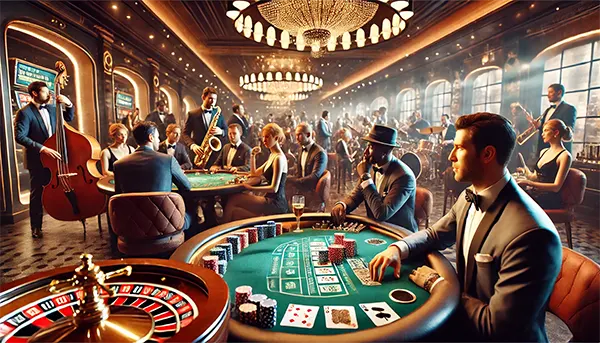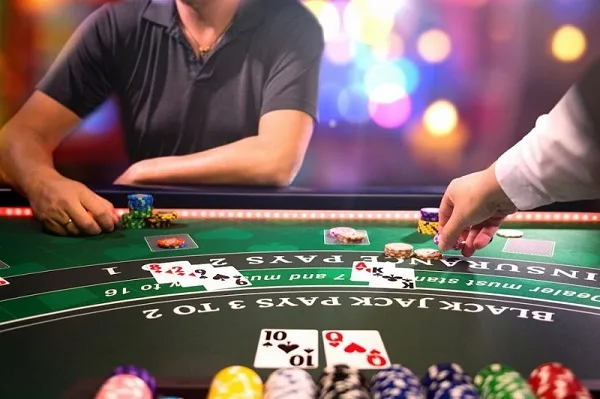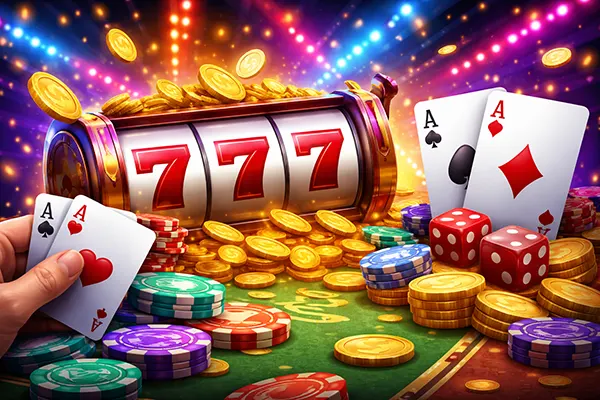
How Music Affects Risk Levels in Gambling: A Scientific Perspective 2025
Music plays a crucial role in shaping human emotions and behaviour. From influencing shopping habits to affecting driving speed, its psychological impact is undeniable. But how does it affect gambling behaviour? Scientific studies reveal that background music in casinos can significantly influence decision-making, risk-taking tendencies, and betting strategies. In this article, we explore the latest findings on the interplay between music and gambling risk levels.
The Psychological Influence of Music on Gamblers
Music affects human cognition and emotional states, making it a powerful tool in casino environments. Research has shown that different tempos and genres can alter players’ levels of arousal and decision-making speed. Upbeat, fast-paced music tends to increase betting frequency, while slow, relaxing melodies promote more cautious play.
Studies conducted in casino settings and online gambling platforms indicate that gamblers exposed to high-tempo music take greater risks. This is due to increased adrenaline and heightened emotional states, which reduce the ability to assess risks accurately. In contrast, soft classical music or ambient tunes encourage more strategic and deliberate play.
Furthermore, music can reinforce the psychological reward system. When combined with winning sounds, celebratory tunes trigger dopamine release, enhancing the feeling of excitement and potentially increasing the likelihood of continued gambling. This reinforcement loop is particularly relevant in slot machines and electronic gaming.
Impact of Music on Betting Patterns
One of the most significant influences of music on gambling is its effect on betting behaviour. Research from neuroscientists and psychologists has found that soundtracks with repetitive beats encourage impulsive betting. This is because rhythmic music synchronises with brain activity, reducing logical thinking in favour of intuitive decisions.
Another study revealed that different music genres can affect game selection. For example, rock or electronic dance music may attract players to high-risk games such as roulette or slots, while jazz or classical music is more commonly associated with strategic games like poker or blackjack.
Additionally, personalised music preferences can impact engagement. Online gambling platforms are increasingly using AI-driven algorithms to customise soundscapes based on user preferences, ensuring a more immersive and engaging gaming experience.
Scientific Studies on Music and Gambling Risk-Taking
Recent studies in 2025 have expanded on earlier findings by using neuroimaging techniques to analyse brain responses to music in gambling scenarios. Functional MRI (fMRI) scans indicate that fast-paced music activates the brain’s reward system, increasing impulsivity and reducing risk assessment capabilities.
In one experiment, participants who played virtual slot machines with high-tempo music placed 20% more bets compared to those who played in silence. The study also found that gamblers exposed to high-energy soundtracks reported a higher sense of confidence in their betting decisions, despite experiencing greater financial losses.
Other research suggests that music with major chords and harmonious structures creates a perception of safety and optimism. This psychological effect can lead players to underestimate risks, prolonging gambling sessions and increasing total bets over time.
Music’s Role in Responsible Gambling
Given its powerful influence, music has become a focal point in responsible gambling discussions. Regulatory bodies are now exploring the potential of sound design in promoting safer gambling practices. Some online casinos are experimenting with adaptive soundscapes that change dynamically to signal risk levels and encourage breaks in play.
For example, some platforms lower the volume or switch to calming instrumental tracks when a player exhibits signs of risky behaviour, such as continuous losses or rapid betting. Such interventions aim to reduce impulsivity and help players make more informed decisions.
Additionally, responsible gambling campaigns now include auditory cues alongside visual alerts. By integrating music with responsible gaming tools, casinos can create a more balanced environment that prioritises player well-being while maintaining entertainment value.

Future Trends: AI-Driven Music Personalisation in Gambling
The evolution of artificial intelligence (AI) is bringing new developments in music personalisation for gambling. AI-powered soundtracks can adapt in real-time to a player’s betting style, emotional state, and gaming habits. These personalised music experiences enhance engagement while also having the potential to influence risk-taking behaviour.
Some online casinos are already integrating AI algorithms to adjust music according to session duration. For instance, if a player has been gambling for an extended period, the soundtrack may shift to slower, more reflective melodies to encourage a break.
Furthermore, researchers are investigating how biometric feedback, such as heart rate monitoring, can be used to fine-tune soundscapes for responsible gambling. Future casinos may employ adaptive audio technologies that respond to physiological cues, ensuring a safer and more personalised gaming experience.
Ethical Considerations and Industry Regulation
With growing awareness of the psychological effects of music in gambling, ethical concerns are emerging. Should casinos be allowed to use high-tempo music to encourage risk-taking? Where is the line between entertainment and manipulation?
Regulatory agencies are beginning to address these questions by considering guidelines for sound design in gambling environments. Some jurisdictions are proposing regulations that limit the use of specific types of music known to influence impulsivity, ensuring that auditory elements support responsible gambling initiatives.
While music remains an essential aspect of casino entertainment, the industry must strike a balance between immersive experiences and ethical considerations. As research continues to uncover the intricate relationship between sound and gambling behaviour, industry stakeholders will need to adapt their practices to align with responsible gaming principles.





